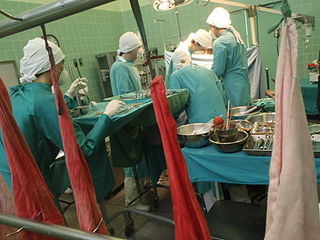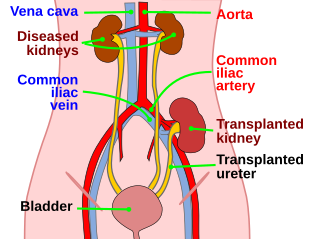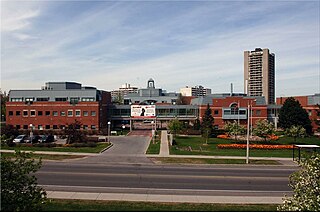
Organ donation is the process when a person allows an organ of their own to be removed and transplanted to another person, legally, either by consent while the donor is alive or dead with the assent of the next of kin.

Organ transplantation is a medical procedure in which an organ is removed from one body and placed in the body of a recipient, to replace a damaged or missing organ. The donor and recipient may be at the same location, or organs may be transported from a donor site to another location. Organs and/or tissues that are transplanted within the same person's body are called autografts. Transplants that are recently performed between two subjects of the same species are called allografts. Allografts can either be from a living or cadaveric source.

Kidney transplant or renal transplant is the organ transplant of a kidney into a patient with end-stage kidney disease (ESRD). Kidney transplant is typically classified as deceased-donor or living-donor transplantation depending on the source of the donor organ. Living-donor kidney transplants are further characterized as genetically related (living-related) or non-related (living-unrelated) transplants, depending on whether a biological relationship exists between the donor and recipient.

Canadian Blood Services is a non-profit charitable organization that is independent from the Canadian government. The Canadian Blood Services was established as Canada's blood authority in all provinces and territories except for Quebec in 1998. The federal, provincial and territorial governments created the Canadian Blood Services through a memorandum of understanding. Canadian Blood Services is funded mainly through the provincial and territorial governments.
The National Kidney Foundation, Inc. (NKF) is a voluntary health organization in the United States, headquartered in New York City, with over 30 local offices across the country. Its mission is to prevent kidney and urinary tract diseases, improve the health and well-being of individuals and families affected by these diseases, and increase the availability of all organs for transplantation. NKF is the largest, most comprehensive, and longstanding patient-centric organization dedicated to the awareness, prevention and treatment of kidney disease in the United States.

Organ transplantation in China has taken place since the 1960s, and is one of the largest organ transplant programmes in the world, peaking at over 13,000 liver and kidney transplants a year in 2004.
Organ procurement is a surgical procedure that removes organs or tissues for reuse, typically for organ transplantation.
Mark Colvin was an Australian journalist and radio and television broadcaster for the Australian Broadcasting Corporation (ABC), and worked on most of the flagship current affairs programs. Notably, based in Sydney, he was the presenter of PM— the radio current affairs program on the ABC Radio network — from 1997 to 2017.
Organ trade is the trading of human organs, tissues, or other body products, usually for transplantation. According to the World Health Organization (WHO), organ trade is a commercial transplantation where there is a profit, or transplantations that occur outside of national medical systems. There is a global need or demand for healthy body parts for transplantation, which exceeds the numbers available.

The Kilgour–Matas report is a 2006/2007 investigative report into allegations of live organ harvesting in China conducted by Canadian MP David Kilgour and human rights lawyer David Matas. The report was requested by the Coalition to Investigate the Persecution of Falun Gong (CIPFG) after allegations emerged that Falun Gong practitioners were secretly having their organs removed against their will at Sujiatun Thrombosis Hospital. The report, based on circumstantial evidence, concluded that "there has been, and continues today to be, large-scale organ seizures from unwilling Falun Gong practitioners." China has consistently denied the allegations.
Organ transplantation in Israel has historically been low compared to other Western countries due to a common belief that organ donation is prohibited under Jewish law. This changed with the passage of new organ donation laws in 2008. If two patients have the same medical need, priority will now go to the patient who has signed an organ donor card, or whose family members have donated an organ. This policy was nicknamed don't give, don't get. The law also defines "brain death" as an indication of death for all legal purposes, including organ donation. Additionally the law provides financial reimbursement to living donors for medical expenses due to donation and lost time at work. Organ trafficking is explicitly banned. Health insurance plans can no longer reimburse patients who go abroad to receive transplants.
"Harvest" is the 14th episode of the second season of the American television show Numbers. Inspired by a Christian Science Monitor article about organ tourists, people who travel to a different country to give their organs for money, and an algorithm developed in the United States, the episode features Federal Bureau of Investigation (FBI) agents and mathematicians attempting to locate a missing organ tourist before she is killed.

The practice of selling one's kidney for profit in Iran is legal and regulated by the government. In any given year, it is estimated that 1400 Iranians sell one of their kidneys to a recipient who was previously unknown to them. Iran currently is the only country in the world that allows the sale of one's kidney for compensation ; consequently, the country does not have either a waiting list or a shortage of available organs.

MOHAN Foundation is a not-for-profit, registered non-government charity organisation in India that works in the field of deceased organ donation and transplantation. MOHAN is an acronym for Multi Organ Harvesting Aid Network. It has offices in Chennai, Hyderabad, Bengaluru, Delhi, Mumbai, Chandigarh, Nagpur, Jaipur and information centers at Kerala and Imphal.

Sunil Shroff is the managing trustee of a non-government and non-profit organisation called MOHAN Foundation and is well known for his work in the field of deceased donation transplantation in India. He has worked towards improving the deceased organ donation rate in India.
Allegations of forced organ harvesting from Falun Gong practitioners and other political prisoners in China have raised concern within the international community. According to a report by former lawmaker David Kilgour, human rights lawyer David Matas and journalist Ethan Gutmann of the Victims of Communism Memorial Foundation, political prisoners, mainly Falun Gong practitioners, are being executed "on demand" in order to provide organs for transplant to recipients. Reports have said that organ harvesting has been used to advance the Chinese Communist Party's persecution of Falun Gong and because of the financial incentives available to the institutions and individuals involved in the trade. A report by The Washington Post has disputed some of the allegations, saying that China does not import sufficient quantities of immunosuppressant drugs, used by transplant recipients, to carry out such quantities of organ harvesting.
Narmada Prasad Gupta is an Indian urologist, medical researcher, writer and the chairman of Academics and Research Division Urology at the Medanta, the Medicity, New Delhi. He is credited with over 10,000 urological surgical procedures and the highest number of urology robotics (URobotic) surgeries in India. He is a former head of the department of urology of the All India Institute of Medical Sciences Delhi and a former president of the Urological Society of India. He received the Dr. B. C. Roy Award, the highest Indian award in the medical category, from the Medical Council of India in 2005. The government of India awarded him the fourth highest civilian honour of the Padma Shri, in 2007, for his contributions to Indian medicine.
Organ transplantation in the Indian state of Tamil Nadu is regulated by India's Transplantation of Human Organs Act, 1994 and is facilitated by the Transplant Authority of Tamil Nadu (TRANSTAN) of the Government of Tamil Nadu and several NGOs. Tamil Nadu ranks first in India in deceased organ donation rate at 1.8 per million population, which is seven times higher than the national average.
Organ donation in India is regulated by the Transplantation of Human Organs and Tissues Act, 1994. The law allows both deceased and living donors to donate their organs. It also identifies brain death as a form of death. The National Organ and Tissue Transplant Organisation (NOTTO) functions as the apex body for activities of relating to procurement, allotment and distribution of organs in the country.









